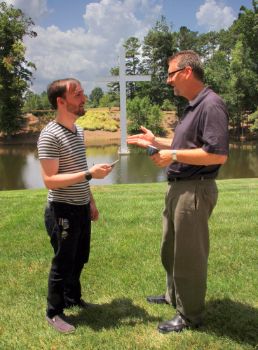
YUKON, Okla.—Pastor Dave Dolphin knew little about Pokémon Go before seeing his church’s middle school pastor surrounded by several boys with phones out on Sunday discovering the new phenomenon that would capture the world’s imagination during the coming week.
It wouldn’t be the last time Dolphin, pastor of Trinity Baptist Church of Yukon, Okla., would see people wandering around the church property staring at smartphones. As a Pokémon Go “gym,” the church has become a go-to place in the community for the game’s players of all ages.
Instead of running from the growing craze, Dolphin says the church is embracing it—by letting players know they are welcome through social media and potentially providing refreshment for players who stop by in the coming days.
The church’s youth also planned an activity where they searched for Pokémon together.
“Everything can be something you can leverage to turn people toward the Gospel,” Dolphin said. “Think about your neighbors that live around you. Your first conversation with them probably won’t be about the sin in their life. It’s going to be about a football game or a basketball game or how they get their lawn to look a certain way. You begin the relationship that way. From there you can turn the conversation—maybe not at that moment but the next—to the gospel.
“On top of that, I think it’s interesting how many churches seem to be Pokestops or gyms,” he said. “Now you have people on your property who are coming there to play this game, and it’s an easy conversation to start.”
Like Trinity, Southern Baptist churches throughout the United States encountered the Pokémon Go phenomenon this past week as players visited their properties to search for digital characters, called Pokémon, and engage in battles. In just over a week after its July 6 release, the smartphone-based game has become the most popular mobile game in American history, according to research by SurveyMonkey. Only Google Maps and Snapchat get more daily users.
The Independent says shares of Nintendo, which owns part of The Pokémon Company, have jumped by more than 50 percent since the game’s release. According to media reports, the game is available right now in the United States, United Kingdom, Germany, Australia and New Zealand.
The game, the newest iteration of the nearly 20-year-old Pokémon franchise, engages players in an “augmented reality,” where they try to find and capture Pokémon hidden throughout the real world. The Australian Business Review has suggested that it may be a “watershed moment” in the development of virtual reality.
Yet the value of the game for many churches is the way in which it has brought people to their doors. Many churches have been included, along with other public places, as Pokestops and gyms in the game.
Gyms are places where players can battle one another and help one of three teams gain supremacy in the location. Pokestops are places where players can pick up free items that help them in the game.
Public places like churches that the game has designated as Pokestops or gyms will likely find themselves visited frequently by players who want to take advantage of the location’s unique status.
Kevin Glenn, pastor of Calvary Baptist Church in Las Cruces, N.M., hadn’t thought much about Pokemon Go until he read an article online about how the game was sending people to churches. When he shared the article on his Facebook page, he immediately heard from college students from his church who appreciated that their pastor had shown an interest in the game.
The church had a long-term vision to engage the culture, and Glenn saw the presence of Pokémon Go players on his church property as an opportunity to demonstrate Christian hospitality.
Glenn began to mobilize players in the congregation to man stations outside the church where players will be able to find water, charging capabilities for their smartphones, free Wi-Fi and conversation about the game (and potentially the gospel). He also hopes to put up similar stations in other public places around town—complete with tablets where players may be able to check out worship services online as they charge their devices.
“My conviction is that there are elements of creativity in the cultural products of our time, like Pokémon Go,” Glenn said. “We can find redemptive analogies in them. We can find the story in those cultural products and engage in them and point people to the Creator.
Chris Martin, an author developer at LifeWay Christian Resources and longtime Pokémon enthusiast, urges churches to engage Pokémon Go players coming to their church. Martin has written several posts on his blog, millennialevangelical.com, educating churches on the game and helping them see the missional potential of reaching out to gamers.
“When you have people literally coming to your doorstep, I would almost go as far as to say it is your responsibility to engage these people—whether they are there for Pokémon Go or they are looking for directions,” Martin said. “If circumstances deliver people to your doorstep, I think you’d be smart to serve them.
“If someone shows up at your church who doesn’t look like they’re dressed for church or you’ve not seen at your church before, be kind to them,” Martin said. “They may be playing Pokémon Go. If they are showing up during service time, you can invite them to services.”(BP)
Tobin Perry